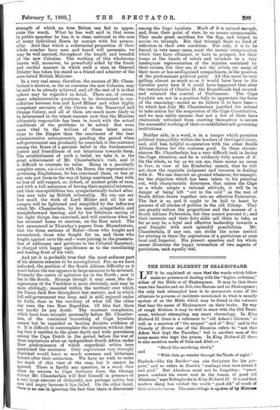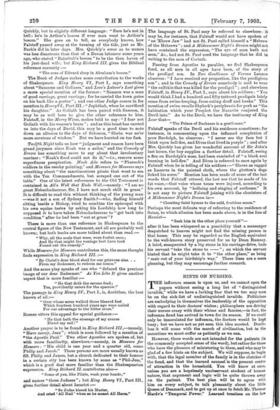THE BIBLE ELEMENT IN SHAKESPEARE.
JET it be explained at once that the words which follow 4 make no pretence of dealing with the "higher criticism," either of the Bible or of Shakespeare. It may be that there were two Isaiahs and no Job, two Bacons and no Shakespeare ; the only task attempted here is to enumerate some of the allusions to persons or incidents mentioned in what is usually spoken of as the Bible which may be found in the volumes that bear the name of Shakespeare on their backs. By way of rough division it may be well to start with the Old Testa- ment, without attempting any exact chronology. In Sing Richard II. there is a reference to "old Adam's likeness," as well as a mention of "the serpent" and of "Eve," and in the Comedy of Errors one of the Dromios refers to "not that Adam that kept the Paradise," but to another man of the same name who kept the prison. In King Richard II. there is also mention made of Cain and Abel:—
" Blood like sacrificing Abel's," "With Cain go wander through theshade of night."
Shylock—like the Devil—" can cite Scripture for his pur- pose," and so refers to Jacob's " eanlings that were streak'd and pied." But Abraham must not be forgotten: "sweet peace conduct his sweet soul to the bosom of good old -Abraham," says Bolingbroke in Sing Richard II. It is sad that modern slang has robbed the words "good old" of much of their attractiveness. The same refuge is spoken of by Mistress and Quickly, but in slightly different language : " Sure he's not in hell : he's in Arthur's bosom if ever man went to Arthur's bosom." She goes on to tell, as everybody knows, how Falstaff passed away at the turning of the tide, just OA Mr. Barkis did in later days. Mrs. Quickly's error as to names VMS less disastrous than that of a Devon labourer some years ago, who stated "Balzebub's bosom "to be the then haven of
his just-dead wife; but King Richard III. gives the Biblical reference correctly :— "The sons of Edward sleep in Abraham's bosom."
The Book of Judges makes some contribution to the works of Shakespeare. King Henry 171, Part I., says something about "Samsons and Goliases," and Love's Labour's Lost gives a more special mention of the former : "Samson was a man of good carriage, great carriage ; for he carried the town gates on his back like a porter" ; and one other Judge comes in for mention in Henry VI., Part III. " Jephthah, when he sacrificed his daughter." As Goliath has been paired with Samson, it may be as well here to give the other reference to him. Falstaff, in the Merry Wives, makes bold to say : "I fear not Goliath with his weaver's beam " ; and as this boast has carried us into the days of David, this may be a good time to note down an allusion to the days of Solomon, "Sheba was ne'er more covetous of wisdom." But we have hurried on too fast.
Twelfth Night tells us how "judgment and reason have been grand jurymen since Noah was a sailor," and the Comedy of
Errors has something more to say about that involuntary mariner : "Noah's flood could not do it,"—i.e., remove some superfluous perspiration. Much Ado refers to "Pharaoh's soldiers in the reechy painting," and Measure for Measure says something about "the sanctimonious pirate that went to sea with the Ten Commandments, but scraped one out of the table." One of the latest references to the Old Testament is contained in All's Well that Ends Well,—namely : "I am no great Nebuchadnezzar, Sir, I have not much skill in grass." It is difficult to read this without thinking of the young man —was it not a son of Sydney Smith P—who, finding himself sitting beside a Bishop, tried to combine the episcopal with his own equine tastes by asking his Lordship how long he supposed it to have taken Nebuchadnezzar to "get back into condition" after he had been "out at grass" P There is more than one reference in Shakespeare to the central figure of the New Testament, and all are probably well known; but both books are more talked about than read :— "Why, all the souls that were, were forfeit once ; And He that might the vantage best have took Found out the remedy."
While Measure for Measure contributes this, the same thought finds expression in King Richard III :—
"By Christ's dear blood shed for our grievous sins. . . From my Redeemer, to redeem me hence."
And the same play speaks of one who "defaced the precious image of our dear Redeemer." As You Like It gives another aspect that is more familiar :— "He that doth the ravens feed; Yea, providently caters for the sparrow."
The passage in King Henry IV., Part L, is, doubtless, the best
known of all :— " Over whose acres walked those blessed feet Which fourteen hundred years ago were nailed For our advantage to the bitter cross."
Romeo utters this appeal for special guidance :—
" He that hath the steerage of my course Direct my sail !"
Another prayer is to be found in King Richard III,—namely, "Ha mercy, Jean"; which is soon followed by a mention of
"the Apostle Paul." Two other Apostles are spoken of, but with more familiarity, elsewhere,—namely, in Measure for Measure "His child is one year and a quarter old, come Philip and Jacob." These persons are more usually known as SS. Philip and James, but a church dedicated to their honour in a certain city has been known by some as "Phil-Jem," which is a good deal more familiar than the Shakespearian expression. King Richard IL contributes also-
" Some of you, like Pilate, wash your hands;" and names "three Judases " ; but King Henry VI., Part gives further detail about Iscariot :-
"So Judas kissed his Master, And cried 'All Hail' when as he meant All Harm." The language of St. Paul may be referred to elsewhere : it may be, for instance, that Falstaff would not have spoken of "an 'Ebrew Jew" had not St. Paul called himself a "Hebrew of the Hebrews " ; and A Midsummer Night's Dream might not have contained the expression, "The eye of man hath not seen," &c., had not St. Paul used the language that he did in writing to the men of Corinth.
Passing from Apostles to parables, we find Shakespeare fond, as all men in all ages have been, of the story of the prodigal son. In Two Gentlemen of Verona Launce observes : "I have received my proportion, like the prodigious son" ; and in the Comedy of Errors somebody is said to wear "the calfskin that was killed for the prodigal " ; and elsewhere Falstaff, in Henry IV., Part I., says about his soldiers : "You would think I had a hundred and fifty tattered prodigals lately come from swine-keeping, from eating draft and husks." This mention of swine recalls Shylock's periphrasis for pork as "the habitation which your Prophet the Nazarite conjured the Devil into." As to the Devil, we have the testimony of King Lear that— "The Prince of Dearness is a gentleman."
Falstaff speaks of the Devil and his residence sometimes ; for instance, in commenting upon the inflamed complexion of poor Bardolph, he observes : "I never see thy face but I think upon hell-fire, and Dives that lived in purple " ; and after Mrs. Quickly has given her wonderful account of Sir John's last hours, the boy supplies a further detail. Falstaff, seeing a flea on Bardolph's nose, had been reminded of "a black soul burning in hell-fire." And Dives is referred to once again by Falstaff when he is telling of his soldiers :—" Slaves as ragged as Lazarus in the painted cloth,. where the glutton's dogs licked his sores." Mention has been made of some of the last words that Falstaff uttered, the last use that he made of hie fat voice,—that voice whose tones were injured, according to his own account, by " hollaing and singing of anthems." It is not easy to picture Falstaff joining with the choristers of A Midsummer Night's Dream in-
" Chanting faint hymns to the cold, fruitless moon." Perhaps the most delicate way of referring to the residence of Satan, to which allusion has been made above, is in the line of Hamlet—
"Seek him in the other place yourself "— after it has been whispered as a possibility that a messenger despatched to heaven might not find the missing person in that home. This may be regarded as the English equivalent to the well-known story preserved for us by Dean Ramsay. A laird, exasperated by a big stone in his carriage-drive, bade his servant "take the stone to — " , on which the servant hinted that he might take it to "the other place," as being " mair out of your lairdship's way." These lines are a mere gleaning, but they may encourage further research.











































 Previous page
Previous page